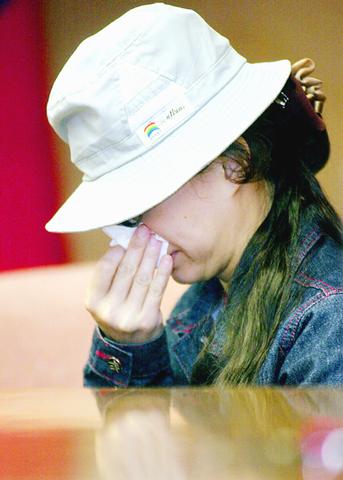The unemployed single mother who on Monday accused a national policy advisor of rape held another press conference yesterday in order to repeat her accusations.
Accompanied by her lawyer and New Party lawmaker Hsieh Chi-ta (

The woman maintained that Chen's claim that there had been no sexual assault was a lie and went on to call him a "pervert" and a "nobody." She denies ever asking Chen for money or engaging in sexual conduct with him until the May 5 incident.
The woman restated that Chen invited her to his Shihlin residence under the pretense of offering to help her find a job. She said that once she had entered his apartment, Chen immediately sexually assaulted her.
"Chen said to me `I'm a National Policy Advisor,' `I'm a good businessman' and I'm close to President Chen,'" the woman said.
The woman waited until he fell asleep before escaping and reporting the incident to Shihlin police.
In response to the charges, Chen yesterday said that he had known the woman for six years and had had sex with her at least four times. Denying the woman's story, Chen said that she may be acting under the influence of a politician.
Chen said that on May 5, he brought the woman to his apartment to rest and that she insisted on having sex, after which he fell asleep. When he awoke he thought her absence was simply a game of "hide-and-seek." It wasn't until police arrived that he realized he was being charged with sexual assault.
Chen said that during the past six years, he and the woman had seen each other occasionally and maintained a good relationship. He said that on occasion he had even offered financial assistance to the woman.
Chen, who has been one of President Chen Shui-bian's (
The case has been handed over to prosecutor Chien Ching-yu (簡靜玉). The Shihlin police released a statement saying that the nature of the relationship between Chen and the woman as well as the events of May 5 would be established within the next week.

MAKING WAVES: China’s maritime militia could become a nontraditional threat in war, clogging up shipping lanes to prevent US or Japanese intervention, a report said About 1,900 Chinese ships flying flags of convenience and fishing vessels that participated in China’s military exercises around Taiwan last month and in January last year have been listed for monitoring, Coast Guard Administration (CGA) Deputy Director-General Hsieh Ching-chin (謝慶欽) said yesterday. Following amendments to the Commercial Port Act (商港法) and the Law of Ships (船舶法) last month, the CGA can designate possible berthing areas or deny ports of call for vessels suspected of loitering around areas where undersea cables can be accessed, Oceans Affairs Council Minister Kuan Bi-ling (管碧玲) said. The list of suspected ships, originally 300, had risen to about

DAREDEVIL: Honnold said it had always been a dream of his to climb Taipei 101, while a Netflix producer said the skyscraper was ‘a real icon of this country’ US climber Alex Honnold yesterday took on Taiwan’s tallest building, becoming the first person to scale Taipei 101 without a rope, harness or safety net. Hundreds of spectators gathered at the base of the 101-story skyscraper to watch Honnold, 40, embark on his daredevil feat, which was also broadcast live on Netflix. Dressed in a red T-shirt and yellow custom-made climbing shoes, Honnold swiftly moved up the southeast face of the glass and steel building. At one point, he stepped onto a platform midway up to wave down at fans and onlookers who were taking photos. People watching from inside

Japan’s strategic alliance with the US would collapse if Tokyo were to turn away from a conflict in Taiwan, Japanese Prime Minister Sanae Takaichi said yesterday, but distanced herself from previous comments that suggested a possible military response in such an event. Takaichi expressed her latest views on a nationally broadcast TV program late on Monday, where an opposition party leader criticized her for igniting tensions with China with the earlier remarks. Ties between Japan and China have sunk to the worst level in years after Takaichi said in November that a hypothetical Chinese attack on Taiwan could bring about a Japanese

STREAMLINED: The dedicated funding would allow the US to transfer equipment to Taiwan when needed and order upgraded replacements for stockpiles, a source said The US House of Representatives on Thursday passed a defense appropriations bill totaling US$838.7 billion, of which US$1 billion is to be allocated to reinforcing security cooperation with Taiwan and US$150 million to replace defense articles provided to the nation. These are part of the Consolidated Appropriation Act, which the US House yesterday passed with 341 votes in favor and 88 against. The act must be passed by the US Senate before Friday next week to avoid another government shutdown. The US House Committee on Appropriations on Monday unveiled the act, saying that it allocates US$1 billion for the Taiwan Security Cooperation Initiative